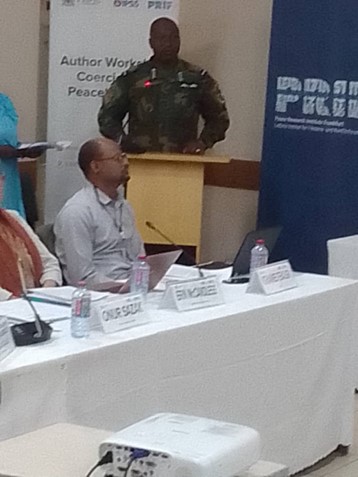A three-day Authors’ workshop, aimed at providing a platform for scholarly discourse on the intricate interplay between coercion and peacebuilding, has been held at the Kofi Annan International Peacekeeping Training Centre (KAIPTC) in Accra.
The discourse extends to examining ECOWAS’s coercive approaches in sub-regional interventions, shedding light on its role in achieving peacebuilding objectives in partnership with the Peace Research Institute Frankfurt (PRIF) and Institute for Peace and Security Studies (IPSS).
In his welcome address, Air Commodore David Anetey Akrong, Deputy Commandant-KAIPTC, observed that Brazil’s South-South approach is considered a non-coercive alternative in African peacebuilding – offering insights into unconventional strategies.
The Deputy Commandant-KAIPTC stated that the workshop’s genesis can be traced back to the remarkable success of last year’s deliberations on coercion in the realm of peacebuilding.
He added that the primary objective of this collaboration is to engage in both theoretical reflection and empirical investigation.
Also, as part of the deliberations, participants delved into Turkey’s post-Westphalian approach; tracing its historical trajectory and emphasising the role of coercion in conflict resolution.
Dr. Antonia Witt, Director-PRIF, said the collaborative effort is important in two regards. Firstly, it allows a discourse on the ambivalent relationship between peace and coercion. Secondly, for PRIF, it deepens collaboration in research and publishing institutes.
In an interview with the media, Dr. Witt said they have been working on the project for the past two years and had a workshop at the KAIPTC a year ago, and this workshop is to consolidate work coming out of it.
The intention is to work toward a joint publication. She said the topic is important because they are studying the role of different actors who are increasingly involved in building peace on the continent.
She added that there is an assumption that peacebuilding goes without coercion but, increasingly, we see that assumption is wrong. The difference between peacebuilding and peacekeeping is increasingly blurred, and we witness military components as part of peacebuilding.
Dr. Witt added that maybe a level of coercion is necessary in peacebuilding. “So the question becomes, how much coercion is necessary for peace to hold?”
Dr. Fana Gebresenbet-IPSS, Ethiopia, lauded the collaborative exercise between KAIPTC, PRIF and IPSS since peace-building is a critical part of the IPSS’ work. He expressed hope that the workshop’s outcome will have policy relevance.










